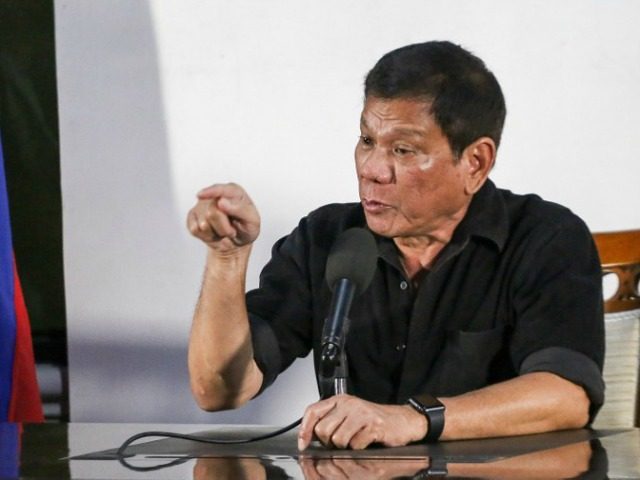Philippines President Rodrigo Duterte has stated he will not abide by the Paris Agreement, an international climate change pact, calling the deal “stupid” and “absurd,” and accusing developed countries of “imposing” on less wealthy states after having committed their own share of environmental atrocities.
Duterte was addressing the Philippine Olympic team at the presidential palace in Manila, sending them off to Rio de Janeiro to compete in next month’s games. He told an anecdote of an unnamed ambassador questioning whether the Philippines will be able to keep its carbon emissions low as per the climate change pact signed in December. The question, Duterte admitted, made him want “to kick him.”
“I said, ‘No. I cannot tell. … You don’t do it that way, Mr. Ambassador. [Your country] had reached the apex [of industrialization] and along the way put a lot of contaminants and emission and went ahead in destroying the climate,’” Duterte said he responded to the ambassador.
“We have not reached the age of industrialization. We’re now going into it. But you are trying [to] stymie (our growth) with an agreement that says you can only go up to here,” he added, calling abiding by climate pacts “stupid.”
“Kalokohan yan [That’s absurd],” he continued, “So that is how very competitive and that is how very constricted our lives [are] now. It’s being controlled by the world. It’s being imposed upon us by the industrialized countries. They think that they can dictate the destiny of the rest of the nation.”
“I will not honor that,” he concluded.
As to whether the Paris Agreement is binding, as the Philippines signed the deal before Duterte took office, he asserted, “That’s not my signature.”
The Philippine Star notes that Duterte had previously said he would abide by the Paris deal, but only if developed countries paid for the Philippines to buy the technology necessary to cut emissions. “They were enjoying the booming [economy] and flooding the air with contaminants. Now that they are rich because of coal and industrialization, we are being asked to cut emission and limit our activities,” he declared.
Environmentalists urged Duterte to engage in a dialogue with them. “Climate change is a complex political issue that requires reflection from the point of view of climate justice. As such, since climate change was largely caused by rich countries, fairness dictates that they shall have a larger share of the responsibility in solving the problem,” Naderev “Yeb” Saño, a climate change activist, told the Philippine outlet Rappler.
“We are willing to sit down with him to discuss the comprehensiveness of the Philippine position and the Paris agreement,” Rodne Galicha, another activist representing the Climate Reality Project Philippines, said.
Rappler notes that “highly industrialized countries like China, the United States, Japan, India and other oil-producing Gulf nations account for almost 70% of the greenhouse gas emissions in 2011.”
The refusal to abide by international climate change regulations comes for Duterte at a time of high tension between the Philippines and its closest developed neighbor, China. Last week, the Permanent Court of Arbitration at the Hague rejected Chinese claims to the South China Sea consisting largely of Philippine territory. China has refused to abide by the verdict, calling it an imposition from Japan and the United States, neither of which had a role in the trial.
During its illegal occupation of the South China Sea, China has destroyed at least 17 reefs, constructing artificial islands to be used as military assets. Philippine activists have also found evidence of China’s dumping chemicals into South China Sea fishing grounds traditionally frequented by Filipino fishermen so as to deter them from being present in sovereign Philippine territory.
The Chinese government, through the propaganda outlet The Global Times, vowed to protect the environmental integrity of the disputed territory in the region in May. “Once China’s construction activities are complete, ecological environmental protection on relevant islands and reefs will be notably enhanced and such action will stand the test of time,” an official vowed.

COMMENTS
Please let us know if you're having issues with commenting.